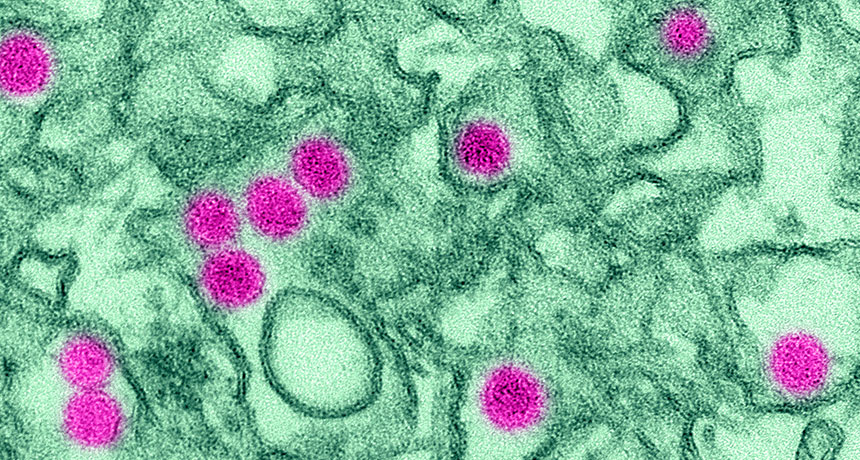Unknowns about Zika virus continue to frustrate
Public health officials race to find answers, develop a vaccine

GOING VIRAL Zika virus (shown in this false-color transmission electron micrograph) continues to spread across the Americas, and may be linked to a recent rise in birth defects in Brazil.
Jessica Wilson/Science Source
WASHINGTON — As worry about the Zika virus outbreak continues to ratchet up, scientists are scrambling to understand what threats the virus poses and how to stop it from spreading. But researchers are coming up with more questions than answers.
“It clearly is a cause for huge concern,” World Health Organization official Christopher Dye said February 12 in a news conference at the annual meeting of the American Association for the Advancement of Science.
Since May 2015, the mosquito-borne virus has steamrolled through Brazil — infecting potentially 1.3 million people — and spread to at least 25 other countries and territories in the Americas. Public health officials have linked Zika virus to several deaths and a neurological disorder called Guillain-Barré syndrome. And evidence is mounting that Zika is to blame for Brazil’s recent spike in babies born with undersized heads and malformed brains (SN: 2/20/16, p. 16).
“We’ve gotten to the point now where we have to say Zika is guilty now until proven innocent,” Dye said.
Brazil has reported more than 4,000 cases of the birth defect, called microcephaly, since October 2015. Dye said he expects the number to rise.
On February 1, the WHO declared that the microcephaly cases linked to Zika were an international public health emergency (SN Online: 2/1/16), and recommended that people traveling to Zika-affected countries take measures to avoid mosquito bites. The U.S. Centers for Disease Control and Prevention issued a firmer warning on January 22, advising that pregnant women should consider postponing travel. The WHO followed suit February 12.
International travel could help the disease spread, Anthony Fauci, director of the National Institute of Allergy and Infectious Diseases in Bethesda, Md., said at the press conference. In any given year, at least 30 million people go back and forth between the United States and the Caribbean and South America, he said. Roughly 500,000 of these travelers are pregnant women.
Scientists know that the first trimester of pregnancy is an especially vulnerable period, but Zika infections late in pregnancy don’t necessarily mean babies are in the clear, Fauci said. “It’s likely that the most profound effects are early in pregnancy, but we don’t know enough about it.”
Much about the virus remains unknown, Dye said, including exactly which mosquito species can carry the disease, and how far the outbreak could reach.
“We’re not completely sure about the range of vectors that are responsible. We don’t know completely what range will be covered across the Americas, and we’re not certain about the efficacy of control methods of mosquitos or of personal protection,” Dye said.
Zika virus hasn’t gained a foothold in the United States yet, though the CDC has reported 52 cases in travelers returning home from Zika-afflicted regions. Fauci said he wouldn’t be surprised if Zika popped up in a few pockets across the country and spread locally, but he doubts that an outbreak would gain much steam. “You never say never,” he said, “but it is highly unlikely.”
The National Institutes of Health is currently working on a Zika virus vaccine, but it probably won’t be ready for testing in clinical trials until the end of 2016, Fauci said.







